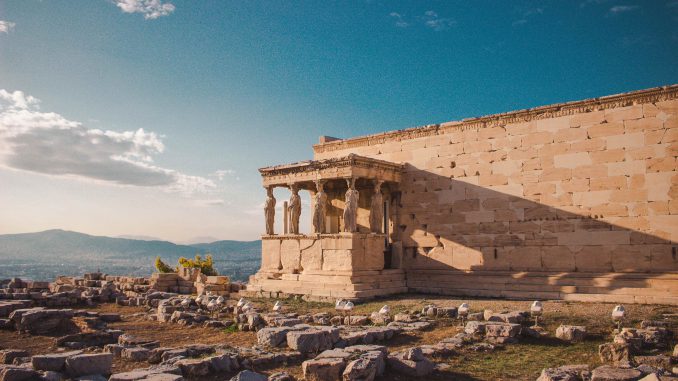

Every summer I get excited about welcoming a new group of students to King’s so fascinated by the ancient Greeks and Romans (as well as their neighbours in Egypt, the Levant and Persia) that they want to spend three years discovering more.
In my experience Classics students come from diverse backgrounds. Some have studied either Latin or Greek (or both), but most of our undergraduates have fallen for the classical world through studying Classical Civilisation, or Ancient History, or visiting museums and watching movies.
The umbrella-term ‘Classics’ covers a massive range. It’s the only subject where you assemble a multidimensional picture of an entire civilisation over many centuries—what it was like to live in it, what made a leader successful or disastrous, what was considered beautiful, what gods did its inhabitants worship (or, in the case of some philosophers, repudiate), how they ate, enjoyed themselves, made love, war and speeches and the stories they told each other.
Whilst most of our students start by studying general themes together, they eventually end up specialising. Here at King’s we are blessed with a large enough staff to accommodate everything from Mycenaean archaeology to the Roman Empire’s conversion to Christianity, Plato’s ideas about the soul to performances of ancient drama today.

To find out what kind of classicist you might become, do this thought experiment. If homo sapiens died out and you were an intergalactic alien arriving on Planet Earth in 2,000 years’ time, which ONE piece of evidence would you choose to make sense of the earthlings’ past? A semi-detached house plus its contents (an archaeologist!), a record of parliamentary debates (a historian!), a set of books by humanists and practitioners of different religions (a philosopher!), the National Gallery (an art historian!) or an episode of Eastenders (a literary scholar!)
I am one of the last. I mainly teach courses on imaginative and fictional texts from antiquity—drama, epic, love songs—and the way they have inspired more recent culture, from movies like Spartacus to Medea at the National Theatre with Helen McCrory—one of the productions on which I’ve been professional Consultant.

I often get asked about what career you can do with Classics. I think employers appreciate Classics graduates because they see things in the round, have studied techniques of clear argumentation and persuasion (what the ancients called ‘Rhetoric’), and are brilliant at comparative source criticism. They are analytical, constructively sceptical, exceptionally culturally literature, and have read the ancient debates about all the ‘big issues’ still challenging us today (democracy, equality, race, class, gender, sexuality, the environment).
But I would say the important thing when you are choosing a university course is not just what career path it will set you on. It’s about choosing the subject-matter that you personally find inspiring—after all, you’re going to be immersed in it for three years—and that gives you the maximum pleasure.
For all of us teaching in the department here at King’s, we made that choice and have never regretted it. We would love to share our knowledge with you.
Read More:
To see the full extent of undergraduate courses offered, check out the King’s Classics Department.
You can also read Isobel’s 5 Things I Love About Classics at King’s.

keep up the good work on the blog. I love it:)
A note to Steven – I expect that it would make things seem strange at first, but the majority of people I have spoken to reckon it is still worth trying.